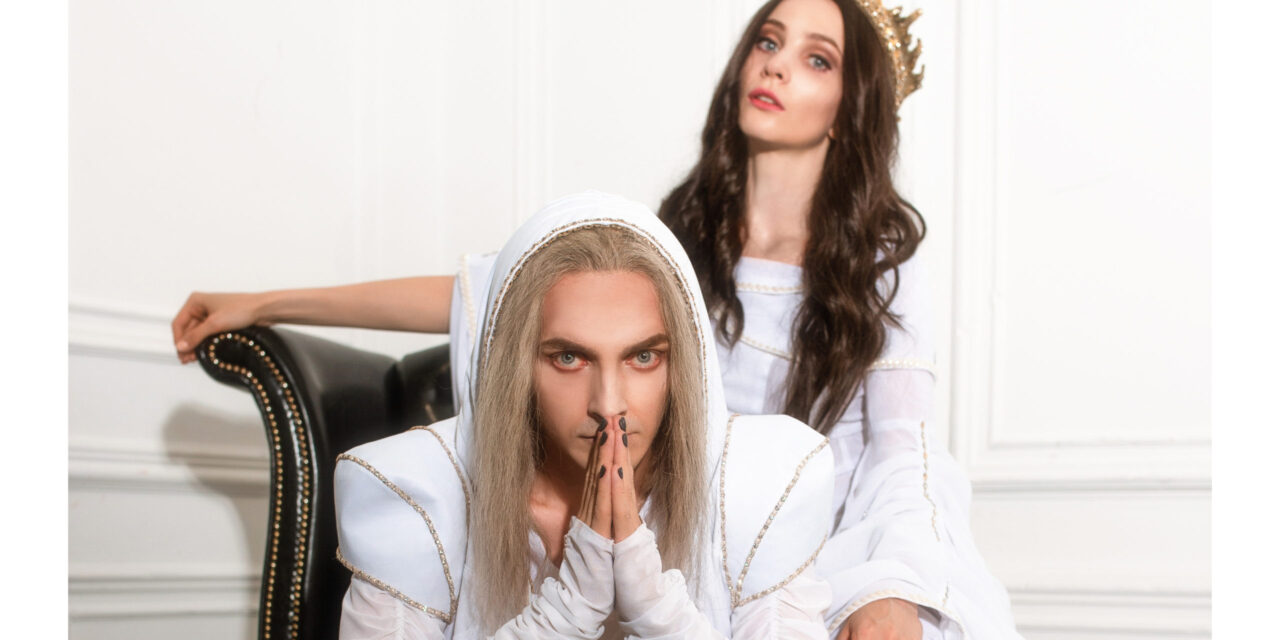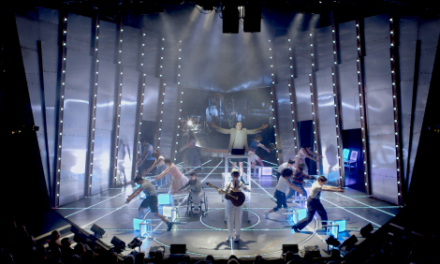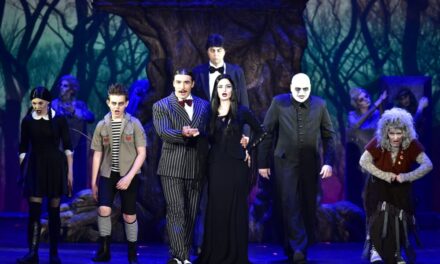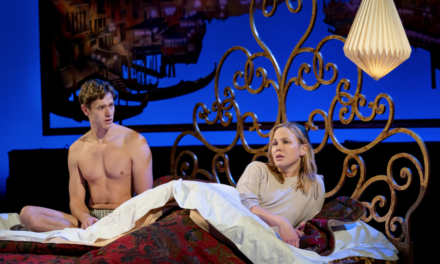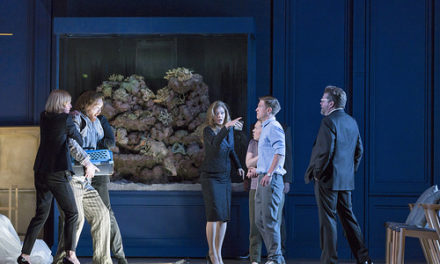The poets say that Love will be the world’s great redeemer,
But love is rarely quite as pure as what they describe
And if that’s the payment, the Gates should require
The price is not that high!
The Last Trial is a Russian fantasy musical based on the Dragon Lance book series created by American writers Laura and Tracy Hickman, as well as Margaret Weis.
The musical has a long and gradual history of creation. It existed in an audio version, which was completely finalized in 2010 and is currently available for listening on Apple Music, Amazon, Spotify, etc. Its creators are composer Anton Kruglov and lyricist and librettist Elena Khanpira. The premiere of the musical’s tour, directed by Ruslan Gerasimenko, took place in 2015. The performance was seen in many cities in Russia and Eastern Europe. In the spring of 2017, the project was released as a film. Since 2018, a static version of the musical has been running in Moscow and St. Petersburg produced by Creative lab STAIRWAY, where it continues to gather loyal fans and audiences.
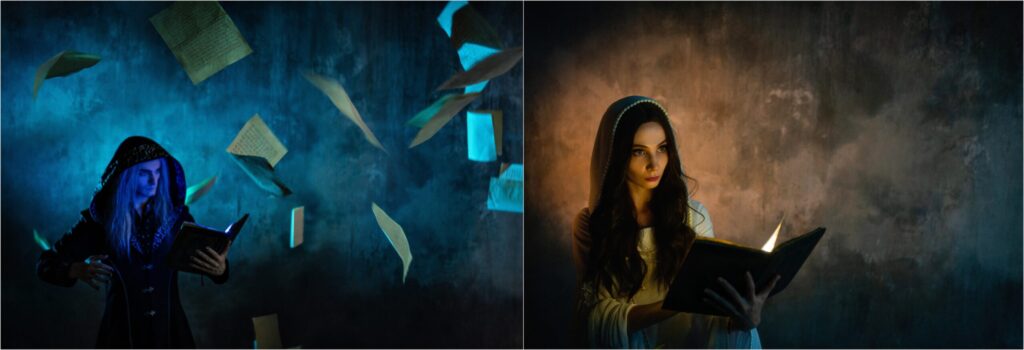
Diptych: Knowledge Palette. Yaroslav Bayarunas, Darya Yanvarina.
According to the plot, the Dark magician Raistlin Majere, in his quest for absolute power, decides to take over the whole world and become a god, but a Light Priestess appears on his way to stop him. This is a story about love and pride, choice and betrayal, and about the test that the Wizard must pass. I saw this musical both offline and online, where a high quality broadcast it is available to to watch. It is an incredibly relevant story, with the power of metaphors and direct messages appealing equally to the mind and heart. The mind draws hundreds of parallels with our world obsessed with achieving goals at any cost, and the heart is tormented by worries for the broken hearts of Raistlin and Crysania, sometimes more than for the worlds they have broken.
The performance made an impression with the seemingly-endless first and second acts, which turned the soul into rags of a white flag, begging the consciousness for mercy. However, the story’s deep immersion produces a unique empathy that, in the end, is extremely difficult to forget.
I interviewed Yaroslav Bayarunas, who plays the leading role of Raistlin Majere in this project.
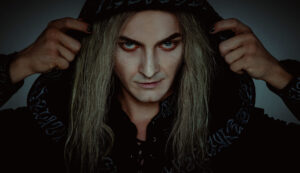
Yaroslav Bayarunas, as Raistlin Majere.
Tanya Vasylkevych: Why, in your opinion, has the musical The Last Trial gained loyal fans over many years in Russia? The shows include artists from different projects, and has active viewers from all over Eastern Europe from countries of the former Soviet Union? In your version, the world of fantasy helps to distract from the harsh reality, music is the engine of this story, and the dramatic line is a feature of the Slavic mentality “‘To suffer is to suffer’” What do you think?
Yaroslav Bayarunas: In addition to the deep, elaborated, unusual, almost underground material from the author, one of the reasons is the fantasy setting. Geek culture exploded rapidly in the 2000s in Russia: comics began to be sold in all kiosks of our countries, movie masterpieces were released like The Lord of the Rings, MMORPG games flourished (World of Warcraft is forever in our hearts. Night elves will not forgive Sylvanas!:)). And most importantly: the image of the dark magician Raistlin Majere turned out to be incredibly attractive, sexy, mysterious and majestic in the musical The Last Trial.
In general, I can name only one character with such an attractive charisma, Count Von Krolock (Graf Von Krolock in German) from the musical Dance of The Vampires in the musical genre in Russia. No characters sexier than these two have yet been created in musicals, this is my opinion. So, the recipe for the success of The Last Trial is as ingenious as the emergence of the human race on earth is a coincidence.

Yaroslav Bayarunas, Darya Yanvarina.
I completely agree with the wording, “The world of fantasy helps to distract from the harsh reality most of all!” Musicals, generally a genre with a low threshold of entry (it is close and easy to understand practically to all viewers), and fantastic fairy tales, are two complementary genres. As for the point about music… I will not separate the work of Anton Kruglov and Elena Khanpira. They wrote such complementary material that it becomes scary what insights they brought to the process of creating this modern tragedy. In The Last Trial, the musical drama is thought out very subtly and, as a leading actor, I can say that in this performance, in musical terms, you can simply swim and follow the music. It leads you to the necessary thoughts, feelings and correct images. The libretto is so philosophically written that it gives scope for acting interpretations.
In short, I am a fan and you will hear nothing but admiration from me! Speaking of the dramatic line, the peculiarity of the Slavic soul which love to suffer, yes, not without this. Raistlin’s story is truly a sight to behold, akin to gladiatorial combat. It is the story of the fall of a powerful and insignificant person, and his personality, spirit and soul to the very bottom. The spectacle is ‘cruel’. Therefore, it satisfies the needs of the public, and this spectacle does not leave them indifferent.
TV: Could this theatrical production, in your opinion, have the same or even greater success in other countries of the world?
YB: To be honest, I have no idea about the preferences of audiences in other countries regarding this particular setting and style. The musical The Lord of the Rings, as far as I know, was not a commercially successful project. But, again, I would first change the positioning policy of the performance. I have said and will continue to say, The Last Trial is not a musical. This is a rock opera, a tragedy.
Before watching, it is imperative that you carefully study the synopsis and allow yourself to accept the rules of the game in this world, its conditions. A lot of them. Rock opera is a genre at the intersection of the academic and avant-garde perception of theatrical action. You need to be ready for this performance. Therefore, I will say the performance, who knows, can gain popularity in countries of other cultures with this positioning.”
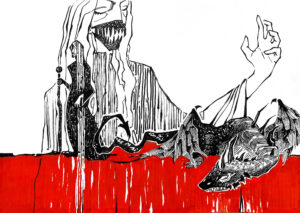
Kill the Dragon VseLennaya.
I also asked permission to share part of an audience member’s response. –The artist Vse.Lennaya,in my opinion, has a fine appreciation of this performance and the experiences of its characters. She says:
“You can justify, explain any goal. But how can you predict which goal will be worth the path traveled? Raistlin is a disgusting, vile creature. I am very glad that you can see Yaroslav the human being after the performance. He is a kind one. And real. Because on stage, Raistlin is a terrible person.
I need no one at all! What are they to me?
Just a faithful sword! Just the master key!
For the greatest of kings, love’s a fatal trap
To subvert his rule! To destroy the fool!”
“Since when has a kiss been equated with love? It can mean anything. And in this case, it is a desire to own. And, therefore, it happens at the very moment when Raistlin sees himself at the peak of his capabilities, when he is on the verge of his final battle. It seems to me that the kiss during the song Trial by Fire had nothing to do with Crysania. At that moment, she fully becomes his instrument. Over the course of the whole story, the magician tries to break her, and finally the priestess surrenders to his power. The name he gave her finally transforms her personality into an instrument, and he kisses the instrument like his magic staff before. After all, these are only symbols of his magic and power. He revels in his omnipotence. This is a story about the realization of your desires at any cost, about the power that unfolds when you don’t limit yourself but go in the chosen direction no matter what. And this story is about the darkness that comes after reaching the goal. He killed the dragon and won. But he did not kill the dragon in himself.”

NOT US Yaroslav Bayarunas, Darya Yanvarina.
This performance is highly recommended, particularly for those who appreciates the stage incarnations of stories in the genre of fantasy and rock, or is interested in the phenomenon of the relevance of this tragedy, and seeks immersion in the depth of meanings. Philosophy and musical content are intertwined in this performance unusually organically. The ending, where Raistlin turns into a kind of oxymoron, a “Lord of nothing at all,” refers us to the ancient biblical quote, “For what is a man profited, if he shall gain the whole world, and lose his own soul? Or what shall a man give in exchange for his soul?” (King James version, Mathew 6:26). This makes us think about our own ambitions, intentions and their cost, as well as about the role of leaders in our lives, of whom we are pawns in manipulative games on local and global scales. This comes from comparing a fairy tale with visual and absolutely real examples of the history of the past, present and, most likely, our future world. But at the same time, do not forget to look inside yourself. After all, are we not at the same time humans and magicians of our own fragile world, which we are responsible for and where we go through our own trials, in spite of the demons, every day?

Triptych: The Scale of Tragedy. Yaroslav Bayarunas, Darya Yanvarina.
English Lyrics version by Krynnsub
Photos by Anna Bubnova
This post was written by the author in their personal capacity.The opinions expressed in this article are the author’s own and do not reflect the view of The Theatre Times, their staff or collaborators.
This post was written by Tanya Vasylkevych.
The views expressed here belong to the author and do not necessarily reflect our views and opinions.

